Do Women Receive Worse Financial Advice? An Audit Study in Hong Kong, China
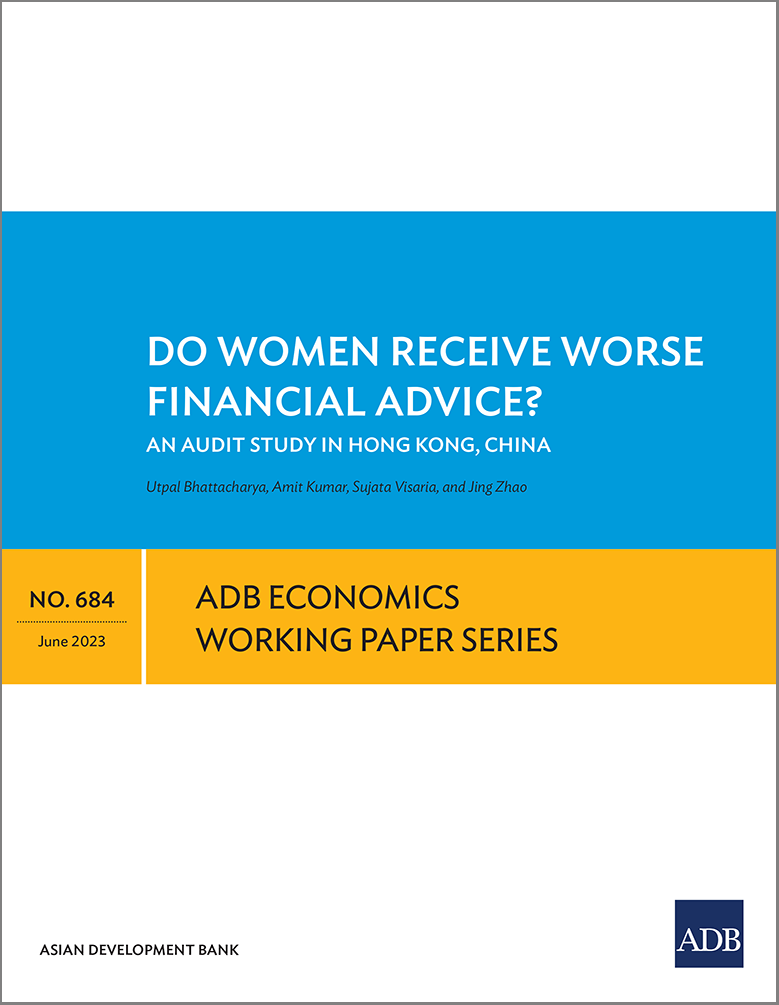

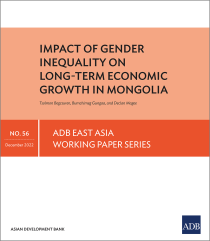
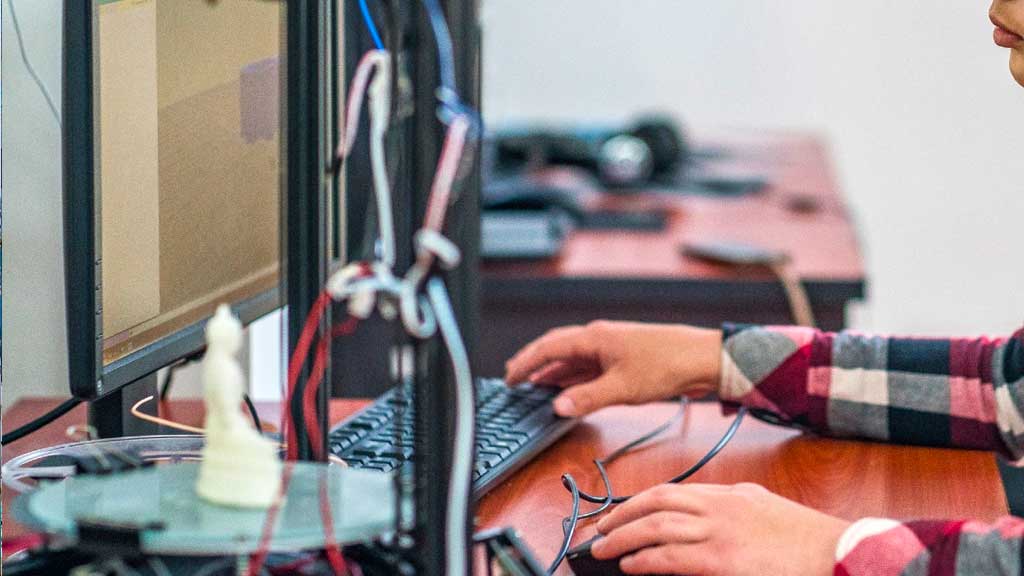
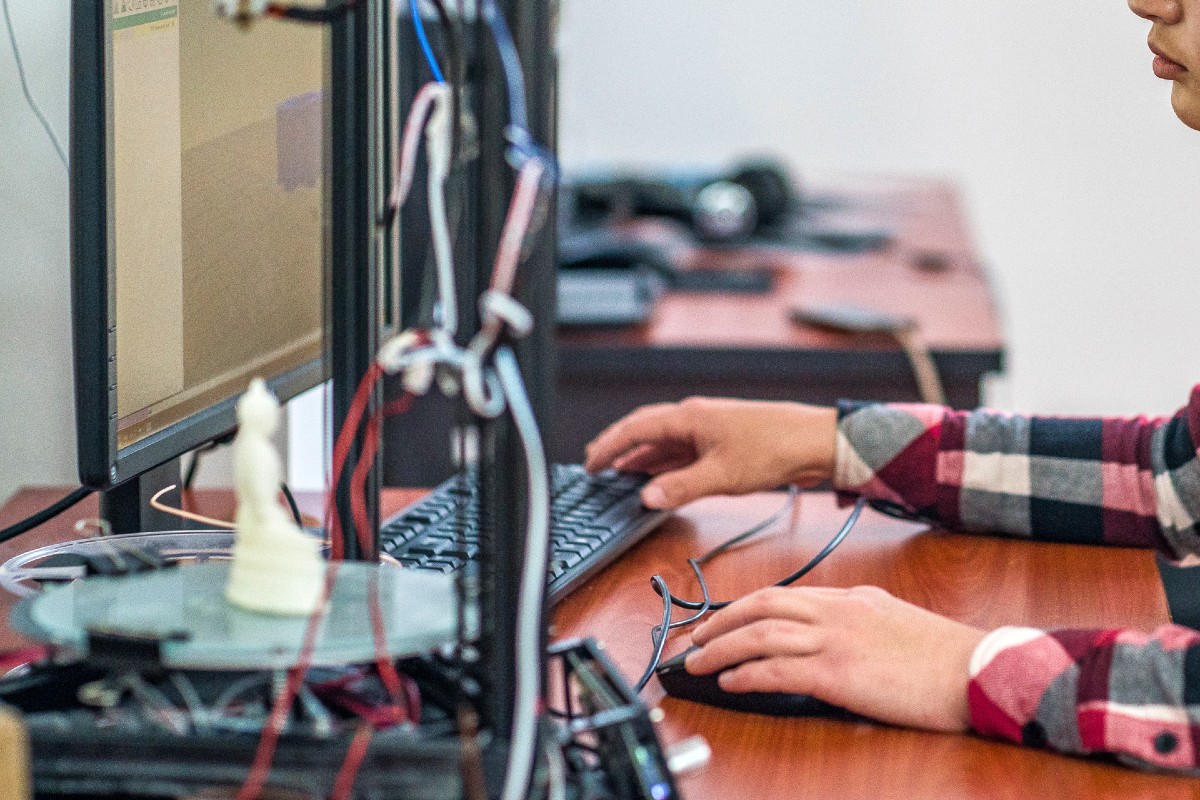
As domestic violence increased during the pandemic, digital technology was used in innovative ways to help victims.
Domestic violence has been a shadow pandemic during the COVID-19 crisis. In Mongolia, where 58% of women have experienced some form of violence by an intimate partner in their lifetime, cases increased by more than 40% in 2020, straining support services, including emergency hotlines.
As more people seek information and services online during the pandemic, urban and rural Mongolia followed the global uptrend in internet use. Facebook users, particularly, rose from 68% (January 2020) to almost 80% (January 2021) driven by Mongolians aged 25 to 45. This is the same demographic that police hotline records tagged as having the highest number of domestic violence cases reported.
One key obstacle to seeking help for domestic violence is the stigma associated with it. As a result, families already suffering from trauma further isolate themselves from help. Digital communication tools can address this particular need for confidentiality and anonymity.
Chatbots – computer programs designed to simulate conversation with human users, mainly over the internet – can be an important digital tool in the effort to help victims. They can be configured to provide social and legal information, and to do so around the clock, providing an opportunity to reach out to people in need and in situations of limited mobility. They are being used in Thailand, South Africa and other countries.
To ensure confidentiality, user details such as name, address, and other demographic details are rendered anonymous by the chatbots.
In Mongolia, chatbots use conversational artificial intelligence and are inbuilt with elemental deep learning techniques. They are integrated in Facebook Messenger, making them widely available.
While chatbots are most often used for routine customer service functions on the internet and are often criticized as being impersonal, this anonymity is a positive feature when helping domestic violence victims. The chatbot does not make any personal judgements and does not require uncomfortable conversations with another human.
To ensure confidentiality, user details such as name, address, and other demographic details are rendered anonymous by the chatbots. While individual data are not accessible, a data management module helps to analyze the overall user data in a way that provides policymakers with insights to develop protection and response protocols.
Chatbots can be programmed to anticipate the information and referral needs of women and girls-at risk. However, if not fed with enough relevant data and controlled for quality, this tool can also lead to frustration. In the case of emergency response, the wrong advice could increase the risk.
In Mongolia, the chatbots were developed by a team of gender, legal, communication, and information technology specialists. The team went through data and spoke with domestic violence survivors to feed the chatbots with extensive content in the form of frequently asked questions: What do survivors have to prepare for? What are their legal options? What happens to their families when they ask for help?
The process is ongoing for this technology. While the chatbots recognize most of the questions, a small number can only be answered by a live person, a counselor.
Nonetheless, this digital technology has proven to be a lifeline for survivors of domestic violence. One user used the chatbot to prepare her rescue from an abusive relationship of nine years. The chatbot gave her information on when to leave, what to take, and how to contact emergency and counseling services. She and her four children reached the safety of a shelter during a strong COVID-19 wave. She used the chatbot precisely because it was anonymous, but also easily accessible through social media.
As next steps, the chatbots in Mongolia are integrating text messaging (SMS) to reach people in rural areas and without internet.
The use of technology such as chatbots is being shown to be an effective additional tool that countries can employ in the effort to address domestic violence and increase access to information and emergency and counselling services for survivors.

Social Development Specialist, East Asia Department, ADB

Senior Communications Officer, Department of Communications, ADB

Principal Infrastructure Specialist (Digital Technology), East Asia Department, ADB
This blog is reproduced from Asian Development Blog.
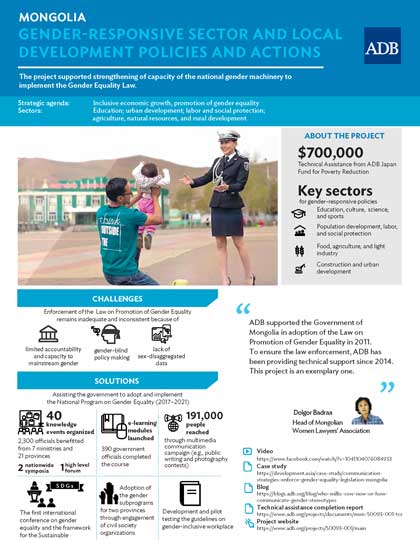
Government of Mongolia organize multimedia campaigns, training, symposia and partnership to promote gender equality.
Technical assistance from ADB help Mongolia to adapt the law on promotion of gender equality in Mongolia.
Limited capacity and accountability, gender blind policy making, and lack of sex-disaggregated data pose challenge for Mongolia to further promote gender equality.
The project supported strengthening of capacity of the national gender machinery to implement the Gender Equality Law.
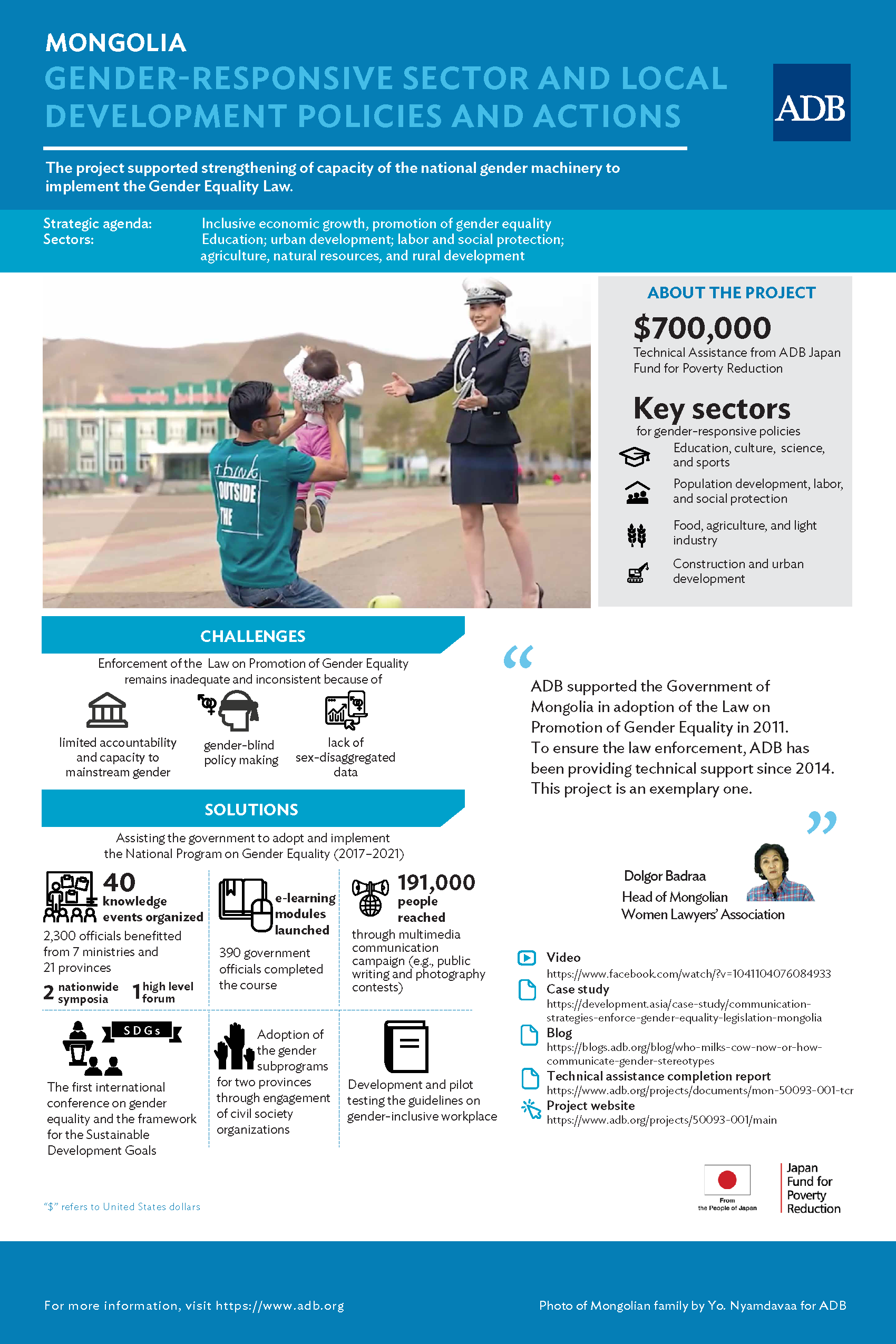


Gender equality needs to be at the forefront to make environmental policies more effective and to speed the full recovery from COVID-19.
Lockdown measures to reduce transmission of COVID-19 in 2020 have exposed the extent of human impact on nature. As people were required to stay inside and work from home and air travel and industrial output dropped significantly, we saw pollution decline and nature bounce back.
In the People’s Republic of China, the decrease in carbon dioxide (CO2) emissions during the first quarter of 2020 has been estimated at 11% compared with the same period in 2019. Mobility and economic activity were drastically reduced during this time.
The return of a blue sky in big cities revealed the seriousness of pollution. It also signaled the need for urgent human action to veer toward sustainable consumption and production given that this year’s decrease in global CO2 emissions (estimated at 7%) will hardly affect overall atmospheric concentrations.
This will require environmentally sustainable policies as well as changes in individual behavior, which is challenging, as demonstrated by the need for recent policies on fireworks prohibition, waste segregation, and wildlife protection. As a Chinese saying goes, “it’s easy to change mountains and rivers, but it’s difficult to change people’s habits.”
This led us to dig deeper into the environmental awareness, attitudes, and behaviors of different social groups and explore the links between sustainable consumption and gender in the People’s Republic of China. We conducted a survey based using the Chinese Family Panel Study and the Chinese General Social Survey. We found that women exhibit higher pro-environmental preferences and behaviors than men in numerous cases, but not always.
Overall, data indicate that women exhibit greener living and working habits than men. Women tend to smoke less, eat less meat and prefer cleaner cooking fuels, such as gas and electricity, instead of coal and firewood. Women tend to put more effort and time toward environmental protection through garbage sorting, recycling, and using reusable shopping bags rather than disposable ones.
Regardless of income and age, women’s transportation choices are more likely to be carbon free. This includes walking, cycling, and public transportation. Women and men hold equally strong awareness about the need for harmony between humanity and nature.
Data also showed improving trends across time and age groups, but young generations appear to have higher environmental awareness and pro-environmental preferences than older generations.
Although science is increasing the odds of overcoming COVID-19, it is more urgent than ever to accelerate action towards sustainable living.
Although we find women are more willing to invest time and physical effort on green actions, we also identified three conflicts that policymakers should note to unleash women’s positive contributions to environmental solutions.
The first conflict is that women are constrained in both finances and time to take more responsibility despite their high social preference towards environmental protection. The gender wage gap is as large as 39% in the People’s Republic of China and larger for the older generation, which partly explains why women are less willing to take on financial burdens related to the environment. We also found that women on average take on more unpaid housework and care work than their male counterparts (1.3 hours more on weekends and 1.1 hours more on weekdays). The gap is even larger for rural women.
Second, women exhibit lower awareness on climate change and industrial pollution than men; despite stronger eco-friendly behaviors in daily life.
Finally, women lack enough political representation to drive the policy discussion. The People’s Republic of China ranked 95 out of 153 countries in terms of women’s political empowerment in the Global Gender Gap Report 2020.
To unleash women’s potential, a level playing field is a prerequisite, and the following actions can help.
1. Close the remaining gender gaps that limit women’s capacity to shape policy. This includes enhancing the social care system to reduce the time poverty of women, promote equal education opportunities, especially for rural women, set up wage transparency mechanisms to promote equal payment, and address gender stereotypes in leadership, politics, and participation in decision-making on green development.
2. Include a gender perspective in the design of sustainable consumption and production policies. We recommend integrating gender analysis into the existing policy agenda of sustainable consumption and production; specifically, policy makers need to ask whether gender differences in information access and decision-making about resources will contribute to the varying impact on men and women.
3. Continue investing in environmental education and awareness of the impact of consumption choices. Action is based on awareness, but we have identified a general “threshold of indifference.” This means that despite efforts at education and improvements over time, still a significant share of the population, regardless of gender or age, continues to have low awareness about environmental processes. Promoting more informed decision making of consumers is needed, including making the origin of products more transparent, developing labeling and certification systems, and adopting product traceability technology.
Although science is increasing the odds of overcoming COVID-19, it is more urgent than ever to accelerate action towards sustainable living. Gender equality needs to be at the forefront to make environmental policies more effective. As Chairman Mao Tse Tung famously stated, “women hold up half the sky”. With women’s enhanced participation and the effort of both men and women, we will eventually hold up the whole sky, making the world better, greener and safer.

Social Development Specialist, East Asia Department, ADB

Economist
This blog is reproduced from Asian Development Blog.
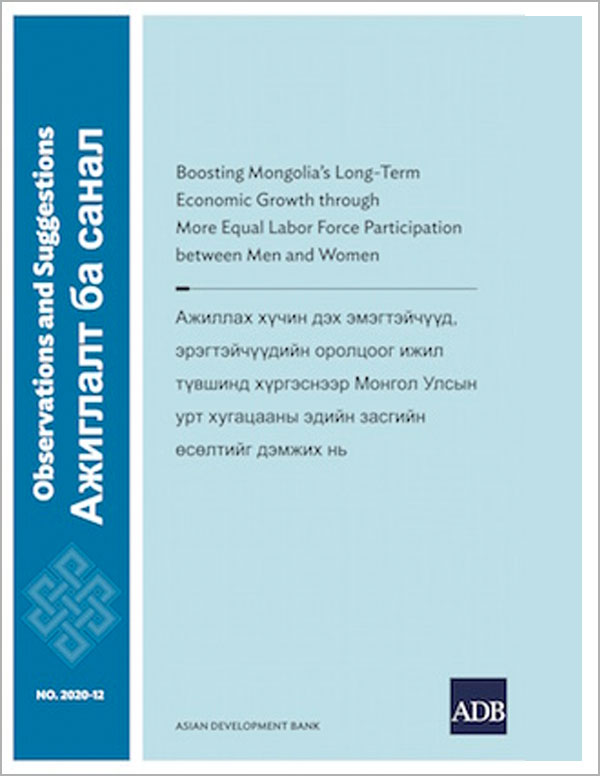
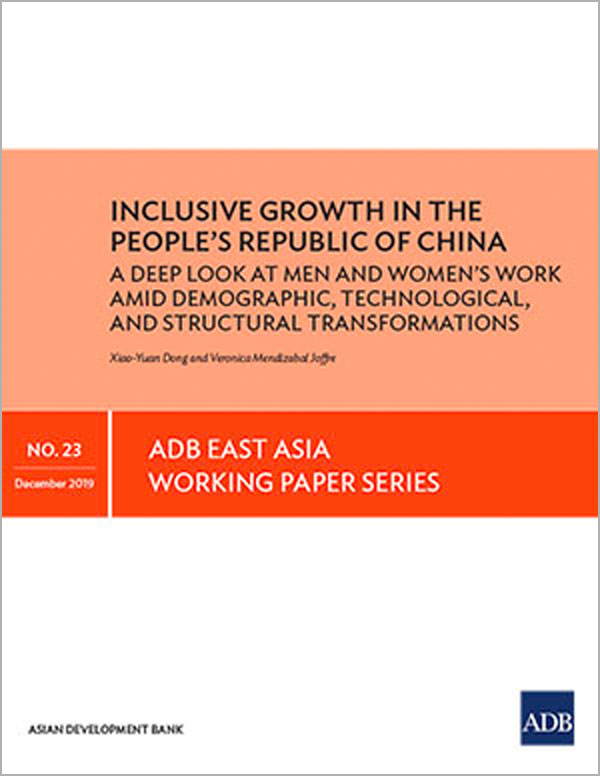
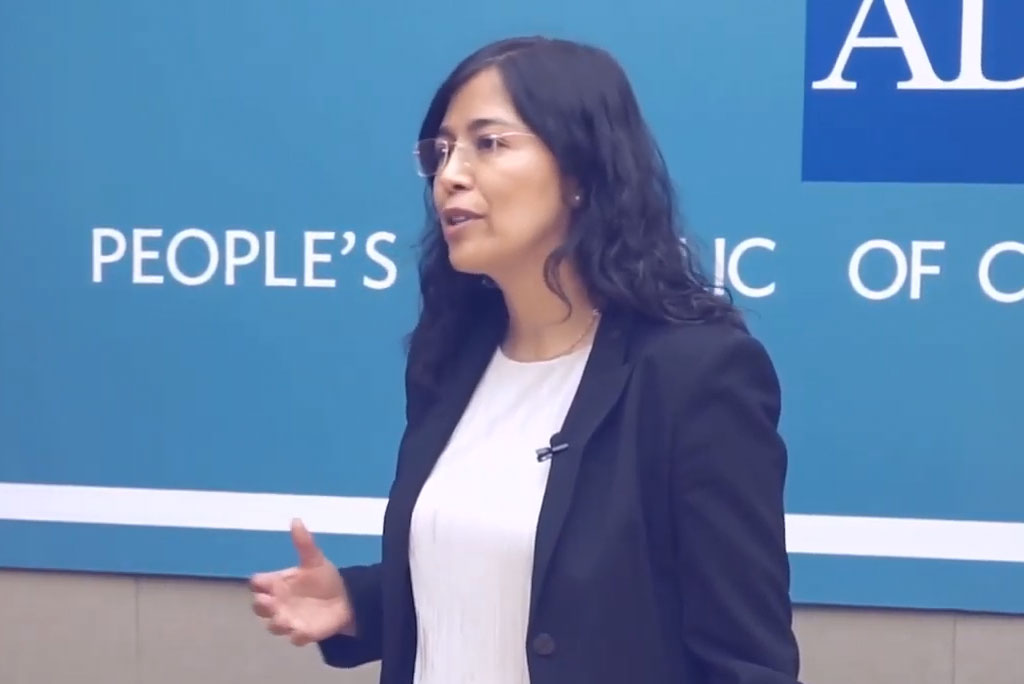
Xiao-Yuan Dong, Professor, University of Winnipeg, and Veronica Mendizabal Joffre, Social Development Specialist, ADB, explain how ongoing demographic and technological changes affect men’s and women’s paid and unpaid work, and how gender dynamics in the labor market and at home interact with inequality defined by education, age, and rural-urban divide.
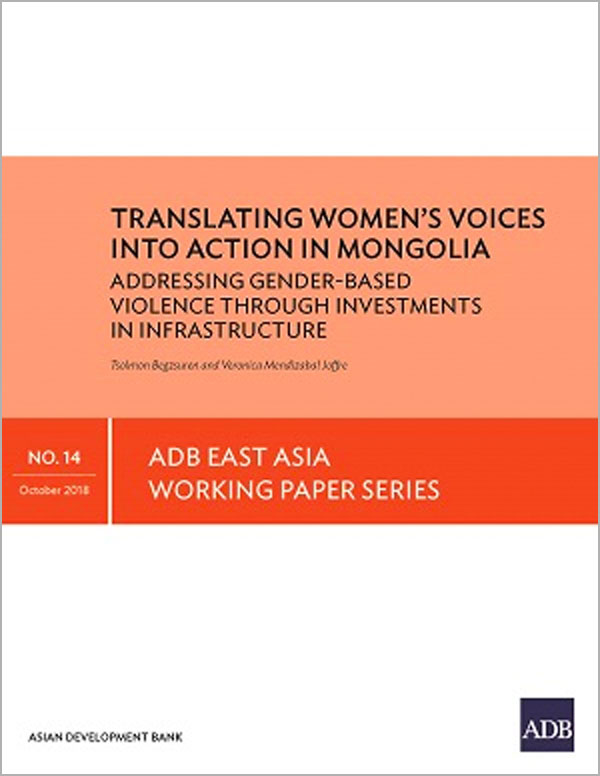
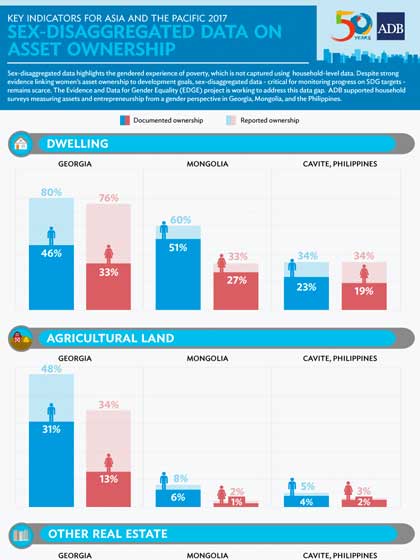
Sex-disaggregated data highlights the gendered experience of poverty, which is not captured using household-level data. Despite strong evidence linking women’s asset ownership to development goals, sex-disaggregated data—critical for monitoring progress on SDG targets—remains scarce. The Evidence and Data for Gender Equality (EDGE) project is working to address this data gap. ADB supported household surveys measuring assets and entrepreneurship from a gender perspective in Georgia, Mongolia, and the Philippines.
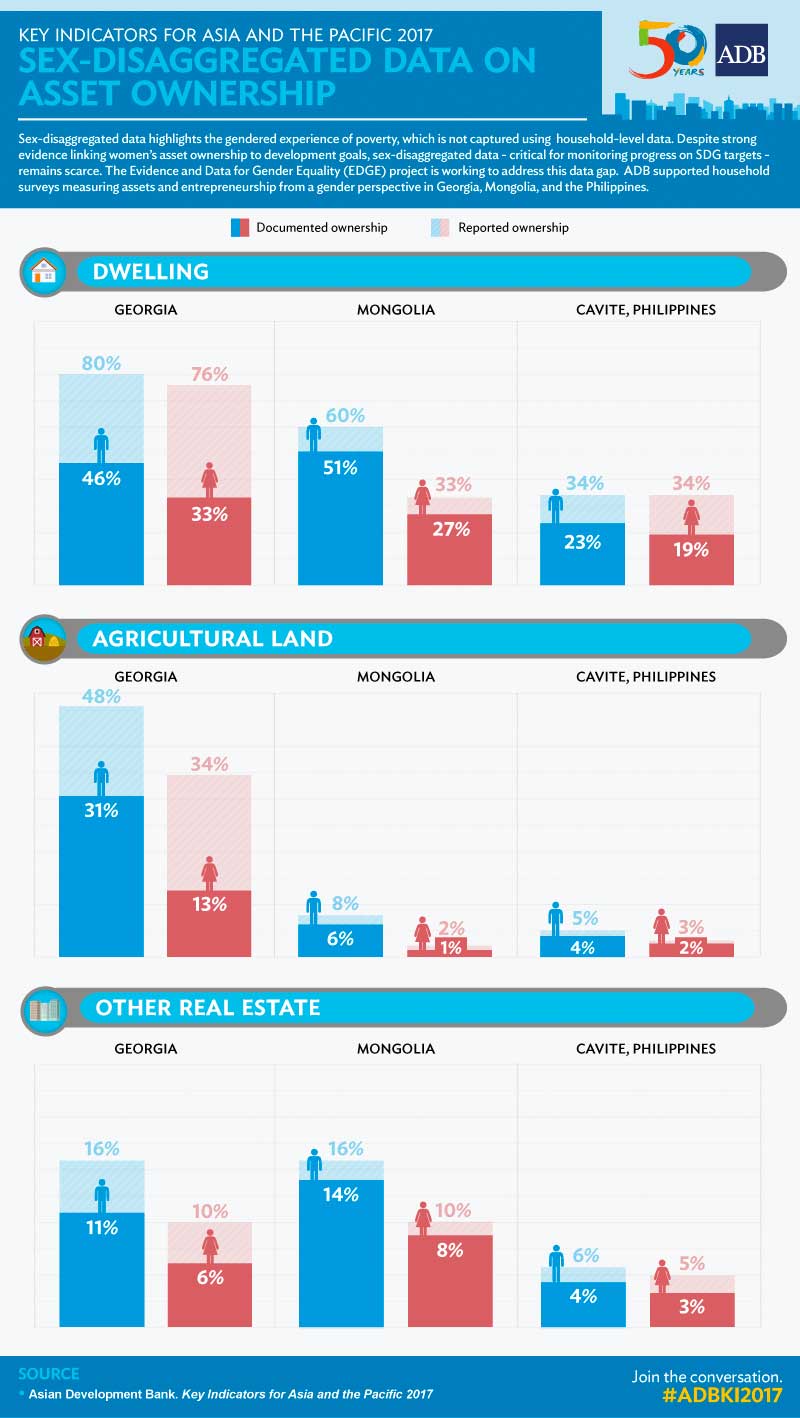
Source: Asian Development Bank.
© 2025 Regional Knowledge Sharing Initiative. The views expressed on this website are those of the authors and presenters and do not necessarily reflect the views and policies of the Asian Development Bank (ADB), its Board of Governors, or the governments they represent. ADB does not guarantee the accuracy of the data in any documents and materials posted on this website and accepts no responsibility for any consequence of their use. By making any designation of or reference to a particular territory or geographic area, or by using the term “country” in any documents posted on this website, ADB does not intend to make any judgments as to the legal or other status of any territory or area.
